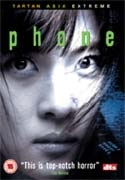
Following the trends set by the successful Japanese RING cycle, with the tendency to link technology and terror, Korean cinema has a stab at high concept supernatural drama with 2002's THE PHONE. Despite being both derivative as to its numerous sources of inspiration, and possibly a little too mainstream for the extreme cinema enthusiasts, it is nevertheless worth the effort and offers one or two fine scenes that manage to be both atmospheric and insidious.
Investigative journalist Ji-Won takes a break after exposing a high profile sex crime ring involving several prominent members of society, and leaves town after receiving death threats from the culprits. Visiting her best friend Ho-Jung, who allows her to stay alone on one of her properties, Ji-Won relocates and changes her cell phone number. After doing so, she begins to receive chilling, indecipherable calls.
Visiting an art gallery with Ho-Jung and her daughter Yong-Ju, she receives another bizarre message. Answered by Yong-Ju, who breaks down, the distressed child's behaviour gets increasingly odd, bordering on the incestuous with her father, Chang-Hoon. Ji-Won investigates, and comes to the realization that the phone number she has changed to is in fact cursed, belonging to a vengeful female spirit who kills anyone unlucky enough to have this numberů
Although clearly indebted to the aforementioned RING films in its basic premise, director Ay Byong Ki draws on a web of intertextual references, that interestingly includes one of the best of Italian horror's heyday. PHONE, at times, could in fact be an inverse SHOCK, replacing possessed David Colin jr's abuse toward harassed mum Daria Nicolodi, with a possessed Yong-Ju's excessive love toward her father. This link is sustained by replicating a scene from Mario Bava's masterpiece, when the child's drawings are amusingly taken to and analysed by a psychiatrist.
The major problem with this post-modern condition, despite some charming little references, is that everybody seems to know everything these days and filmmakers constantly have to remind us what great cineastes they are. This can become problematic, especially on pure visual terms, as films such as this "feel" second hand, lacking natural expression. As such, the cold, formalistic Kubrick-style camerawork is all very pretty, but its impact has been sucked out a little in the process of assimilation.
On the whole, however, the film presents a style in which editing and camerawork efface themselves, allowing us smooth entry into the fiction. This is not always advantageous, however, as films from the surrealist canon, and subsequently Dario Argento and Lucio Fulci, delighted in using a combination of gruelling violence and rococo stylistics to shock spectators out of their complacency. Indeed, the film on the whole feels a little too bright, and high key, a bit too mainstream by some standards.
The film progresses smoothly through its leading characters, especially the beautiful Ha Ji-Won (playing the investigative lead Ji-Won), and utilizes some carefully placed shock sequences that are charged with impact by means of their quick shift from normality to horror, such as the freaky little scene when Ji-Won gives Yong-Ju a piggy back, and glances in the mirror to spot the vengeful spirit clinging to her back. Plenty more scenes give the film value, such as a Black Cat style discovery behind the walls of the house Ji Won stays in, and a nifty little DEEP RED scene in which we see the villain early but fail to realize it.
To go with the sterling transfer, Tartan have provided a plethora of extras, including an audio commentary by the film's principles, a 45-minute behind the scenes that covers the film thoroughly, looking into the technical and performative aspects that went into making the film; as well as individual interviews - all of which perhaps go into a little too much details as to how the film was made, and lacking information on the subtext and meaning of the film.
Review by Matthew Sanderson
| Released by Tartan |
| Classified 18 - Region All (PAL) |
| Extras : |
| Audio Commentary, Interviews, Behind the scenes, Making of featurette, TV spots, Asia Extreme Trailer Reel |